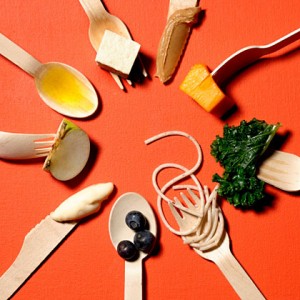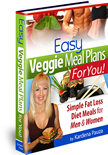How to Get All the Nutrients You Need Without Animal Products
 The most common argument against a vegetarian diet is that you can’t get enough calcium or iron, or that you will need to get a Vitamin B12 shot from your doctor.
The most common argument against a vegetarian diet is that you can’t get enough calcium or iron, or that you will need to get a Vitamin B12 shot from your doctor.
However, it is easy to get plenty of calcium to build strong bones and it’s not difficult to get enough iron. The ONLY nutrient that will take a little extra effort is Vitamin B12.
Calcium:
Everyone thinks you need to drink milk to get calcium, but cows, horses, gorillas, and elephants, some of the world’s strongest and most powerful animals, all have built their big strong bones on a vegetarian diet.
Plant based calcium sources are easier to digest, and you don’t have to worry about being lactose intolerant when you eat plant based calcium sources.
The BEST non-dairy sources of calcium are fortified beverages (such as soymilk and orange juice) and dark, leafy greens like kale and broccoli. Other foods like legumes and almonds can give you calcium.
Iron:
Iron is an important element in your red blood cells to help carry oxygen throughout your body. Iron deficiency is known as anemia and is characterized by chronic fatigue and being susceptible to infections. If these symptoms exist then you MUST first visit a doctor to verify and diagnose the issue.
Since meat is traditionally known as the best source of iron, people think vegetarians will end up iron-deficient and anemic.
However, there are many iron-rich vegetarian foods, and by eating a variety of whole foods the vitamins, minerals, and phytonutrients work together synergistically to maximize absorption of the other nutrients in the foods.
To better explain this, scientists have found that eating vitamin C rich foods with iron rich foods (like spinach) increases the absorption of iron. For example, because bell peppers give you 230% of your daily Vitamin C requirements (that’s more than twice as much as oranges), you can eat a salad containing spinach and bell peppers and you’ll absorb a lot of iron.
Plant SOURCES of iron range from green leafy vegetables (spinach, collard greens, swiss chard, kale), whole grains, legumes, soy beans, black strap molasses and dried fruit. And remember to eat foods rich in vitamin C to enhance absorption.
With that being said, the RDA recommends for pre-menopausal women 15 mg per day and 10 mg for men and post menopausal women.
Here’s a list of iron rich foods:
- Broccoli ½ cup 0.7 mg
- Tofu ½ cup 13 mg
- Black beans ½ cup 1.8 mg
- Molasses, black strap 1 Tbl. 5 mg
- Raisins 1 oz. 0.7 mg
- Parsley 3 Tbl. 0.6 mg
- Whole wheat cereal 1/3 cup 1.1 mg
- Oats, whole rolled 1/3 cup 2.5 mg
- Lentils, sprouted raw 1 cup 2.5 mg
- Buckwheat 1/3 cup 1.3 mg
- Kale fresh 1 cup 1.1 mg
- Beets 1 cup 1.1 mg
- Wheatgrass juice 1 oz. 0.6 mg
As you can see, it’s not hard to get enough iron by consuming whole, natural foods. In addition, many foods – such as breads and cereals – are now FORTIFIED with iron which can help supplement your diet if necessary. However, just watch that these cereals and breads are not refined or full of additives or preservatives.
Vitamin B12:
Vitamin B12 is essential for your body and is stored in the liver and released when it is needed. Scientists like Dr. T. Colin Campbell, author of “The China Study”, say that Vitamin B12 can be stored for up to 3 years. As of right now the only confirmed way to obtain Vitamin B12 is through fortified foods or supplementation. The RDA for Vitamin B12 is 2.4 micrograms for adults.
You may need to talk to your Doctor about taking a Vitamin B12 supplement because this is the one nutrient that is not naturally found in plant foods. So it is ESSENTIAL to make an effort to add this to your diet.
Foods fortified with Vitamin B12 include non-dairy milks (soy and rice milk), veggie “meats” and breakfast cereals. But look at all the ingredients in these foods to eliminate refined products or additives and preservatives.
I personally use “Living Vitamin B Nano Plex” as an excellent source of Vitamin B12. It is the first Vitamin B12 made from probiotic fermentation which is more bioavailable to the body. Another option is taking B12 sublingual (dissolve under the tongue). I recommend methylcobalamin which is naturally occurring.
Cyanocobalamin is a commonly used synthetic B12 supplement that’s also used in fortification of foods because it can be produced so cheaply. When cyanocobalamin is metabolized in the body the by product created in small amounts is cyanide. We are not exactly sure the impact on the body but I don’t feel comfortable using it.
So there you have it – a couple of great vegetarian nutrition tips to increase your iron and calcium absorption, while skipping the special B12 appointments with your doctor.
Your friend,
Kardena Pauza
Author of Easy Veggie Meal Plans for weight loss
How about protein? Is vege protein enough for us?
great article
I’ve found it be plenty for me and my active lifestyle. Even while competing in competitions I have plenty of energy and can build muscle.
Thanks
What about the B12 found in yeast extract ? Is this ok or not ? I have a lot of yeast extract and use it in soups etc as well as on crackers and rice cakes. I also eat a lot of sea veg such as Laverbread ( a Welsh delicacy..( I am Welsh ) made from seaweed and mixed with oats.
I’ve found it to be sufficient for me while being very active and competing on competitions. Developing muscle on a vegan diet has been completely doable.
Yes it is ok. Typically yeast is fortified with B12, and there are plenty of other nutritional benefits to yeast extract. The laverbread sounds interesting, I like seaweed and it’s benefits so I’ll have to try that bread sometime!
A simple and ineltilgnet point, well made. Thanks!